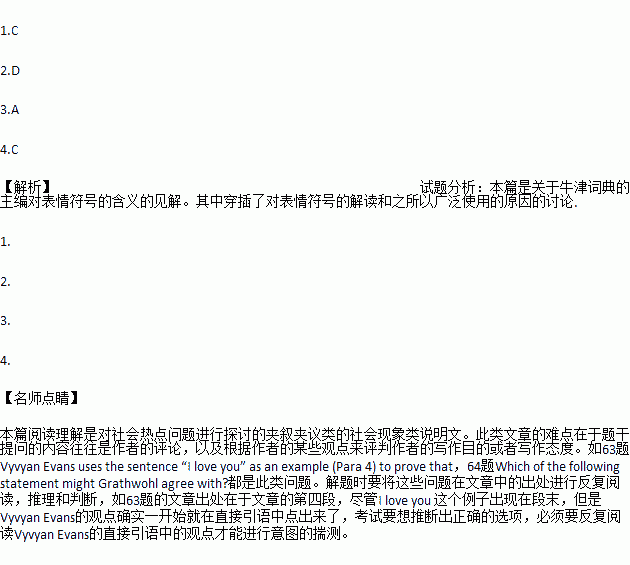题目内容
The Oxford Dictionary has announced its word of the year. It's spelled... Actually, it isn't spelled at all, because it contains no letters, just a “face with tears of joy” emoji.
“The fact that English alone is proving not enough to meet the needs of 21st-century digital communication is a huge change,” says Caspar Grathwohl, president of Oxford Dictionaries. When one of his dictionary colleagues suggested using an emoji instead of the word “emoji”, “lightbulbs went off”. Until recently, Grathwohl, who is 44, avoided using emojis altogether because he worried that he would look as if he “was trying to get in on teen culture”. “I felt inauthentic. But I think there was a tipping point this year. It's now moved into the mainstream.”
Some 76% of the UK adult population owns a smart phone, and of those, between 80% and 90% use emojis. Worldwide, six billion are sent daily. The “face with tears of joy” is the most used, representing 20% of all UK and 17% of all US emoji use. It has overtaken the standard smiley-face emoji in popularity, which may mean that emoji users are moving towards exaggeration or irony or fun, or that all this emoji use has brought everyone to a higher emotional plane. Even if you don't send emojis yourself, you will probably receive them.
How far do emojis function as a language? “There's a lot of prejudice against emojis,” Vyvyan Evans, a professor in linguistics at Bangor University, says. “A lot of people think they are a backward step, but this misunderstands the nature of human communication.” The picture is more complicated, with emojis offering both greater freedom and limitations than verbal language. “Emoji isn't a language as such. They don't develop in the way that the natural language does. But they are working according to the same principles of communication as the spoken language. What is the value of an emoji? I think I can prove this with an ordinary sentence.” There is a pause. “I love you,” he says. “Crikey(哎呀), I love you.” He says it again. The first time I think he means it; the second time we both know he doesn't. “The meaning is coming from extra-language factors,” he says. “Emojis are performing the same function in digital speech.”
Like any sort-of language, emoji is evolving. “I do think they are subtle(微妙) and rich,” Grathwohl says. “They can mean different things to different people. The fact that we are using emoji in combination to express more complex ideas and experiences is one of the most fun and playful parts of the whole words. Will emoji finally come to look something more like traditional language that we understand?” he asks. “That would be interesting.”
1.The sentence “lightbulbs went off” (Para. 2) means that .
A. the president became embarrassed and annoyed
B. the president suddenly realized he was outdated
C. the suggestion was immediately adopted
D. the suggestion started a heated discussion
2.The “face with tears of joy” is more popular than smiley-face emoji, which means that .
A. emoji is changing constantly
B. smiley-face emoji is too traditional
C. adults have more sorrow than joy in their daily life
D. people like to express their emotions in a richer way
3.Vyvyan Evans uses the sentence “I love you” as an example (Para. 4) to prove that .
A. emoji can express the real meaning behind words
B. emoji is different from the natural language
C. people feel free to use emoji in communication
D. emoji will limit people in expressing their feelings
4.Which of the following statements might Grathwohl agree with?
A. Emoji is too childish for adults.
B. People have the same explanation for an emoji.
C. Using emoji can add fun to communication.
D. Emoji won't develop into a language.

